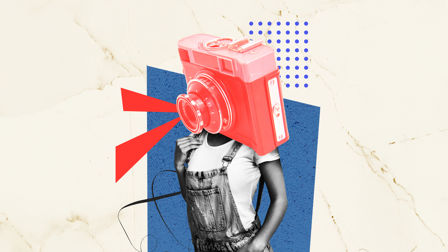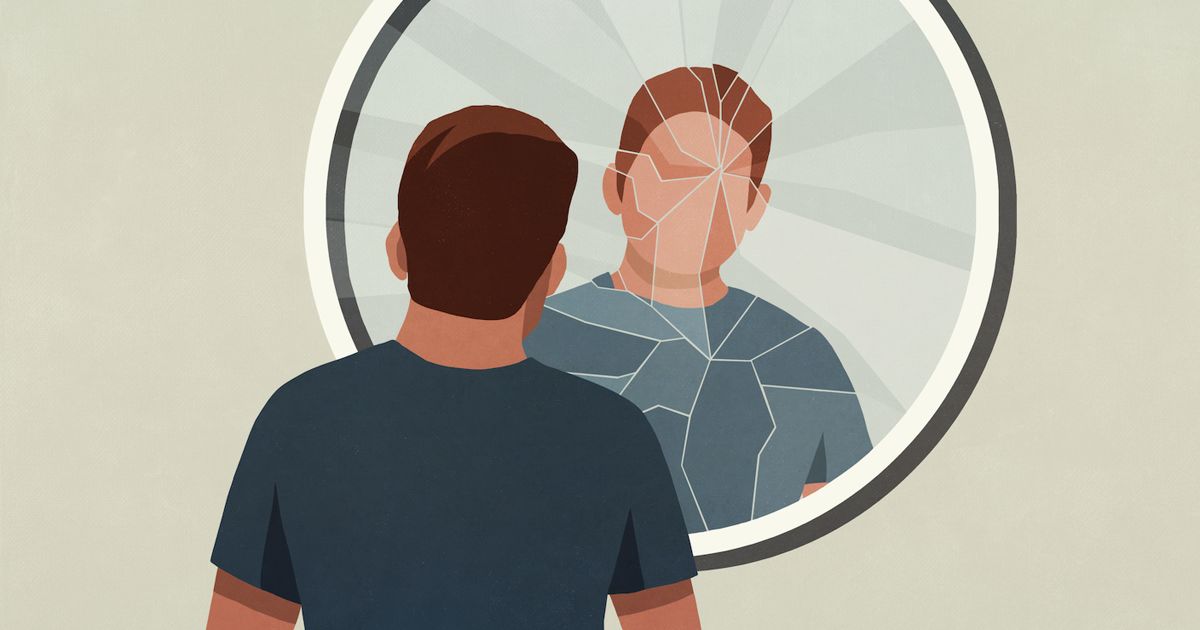The best of minds, the worst of minds: are we mentally ready for the metaverse?
A 21st century idyll where kindness and positivity prevail, or a potentially lawless landscape in which anything goes? The metaverse could be either. Or both. But, asks Amy Kean, are we ready to peer into a dark, morally skewed mirror-world that could severely impact the already fragile mental wellbeing of the planet's youth?
What would you do if you could live in the internet, even just for a day?
Where would you go if you could crawl inside it and paddle through the shallow pools of cyberspace? If you could inhale it? If you could wrap it around your body like a putrid, unwashed blanket?
Oh.
You’d go to Pornhub, wouldn’t you?
According to many futurologists, artists, and the world’s loudest hype-mongers... we’re allegedly striding into the biggest tech and social revolution in history.
Fuck’s sake.
Well, you’re only human.
However, it’s a legitimate question and the stuff of Reddit threads, because according to many futurologists, artists, and the world’s loudest hype-mongers, it’s gonna happen. We’re allegedly striding into the biggest tech and social revolution in history. Which is either very good or very bad, depending on who you listen to.
Let’s start with the bad.

Above: If you could live inside the internet, where would you choose to go?
In 2015 I saw The Nether in London’s West End, an unsettling play set “in the near future” when the internet is so sophisticated you can literally live inside it. The Nether is described as “a vast network of virtual reality realms”; you can smell it, touch it, feel it, holiday in different parts of it, and realise your wildest dreams.
People’s dreams can get pretty wild, by the way. And deviant.
As time passes, a corner pocket of The Nether emerges called The Hideaway: a dedicated space where pedophiles can rape and murder consenting adults - also on the internet - with avatars that make them look like, and act as, children.
Needless to say I was disturbed at the thought of The Nether (and The Hideaway) for some time. Disturbed, but not wholly surprised.
The play itself issues a jarring moral and philosophical debate. Someone pro-The Hideaway might argue that everyone involved is consenting and, if pedophiles are only committing crimes virtually, then no real children are being hurt in the process. Gosh, that’s hard to write.
Someone anti-The Hideaway might argue that intent is intent, regardless of where and how it’s found; the urge is still an urge, and society has declared that urge immoral. And, if someone consents to being a victim, albeit virtual, there’s likely some deeper mental issues involved that need urgently addressing.
Mate. You could discuss it all day - not that you’d want to - and needless to say I was disturbed at the thought of The Nether (and The Hideaway) for some time. Disturbed, but not wholly surprised.

Above: 2015 play, The Nether, posed moral and philosophical questions about intent, moral behaviour and technology's part in our future.
For those of us who’ve seen The Nether - which I’m guessing is thousands of individuals in Europe and the US - there’s a chance the idea of a metaverse makes us feel a little queasy. Not because we don’t think immersive games, cartoon apes, digital clothes or a power shift within the global economy sound fun (they do!) but because, with The Nether, we’ve borne witness to an award-winning, creative, carefully considered challenge that, whatever technology is invented, the worst of people will use it too.
When you’re creating something - anything - how often do you consider the worst of people?
When you’re creating something - anything - how often do you consider the worst of people?
The worst of people pop up everywhere, but especially on social media. One of my old clients - a pizza company - once had to very quickly and subtly deal with a staff member (pun intended) filming themselves masturbating over a… ‘product’... before it went in the oven, then uploading the video to YouTube.
Actually, this happened a few times, from a few different employees. What seems disgusting to us is positively appealing to some. (A couple of years earlier we built a virtual pizza restaurant for this brand in Second Life, but I don’t think any wanking took place in that.)

Above: We're now in the period of play and testing with the metaverse, illustrated by Pringles' crypto-crisp.
A lot of people find the idea of a metaverse appealing. Definitions of it vary; for some it’s simply a renamed virtual reality (in a bid to finally send VR mainstream?), whilst others share more poetic articulations: a series of interconnected worlds and experiences made possible by a new wave of open technologies; the utopia of true self-expression via holistic digital identities, democratised content creation and asset ownership. It’s a slick narrative, and a booming industry filled with experimentation and anticipation.
BUT MARK!… WHY ARE YOU RECREATING THE ROOM THAT I AM ALREADY IN AND THEN TELLING ME TO BE EXCITED ABOUT IT?
As with every new technology, or application of technology, we’re currently in the period of play and testing. There're cowboys, big thinkers, and PR stunts. In March, Pringles created a fucking crypto-crisp. (Although why they didn’t have the balls to create their own ‘cryspto’ currency is beyond me. Go big or go home.)
But this is just the hype-cycle going through its motions. “You called?” yells Mark Zuckerberg; the wicked uncle of hype, who’s been boning over his version of the metaverse lately, where you can be just as awkward as he is, but in a VR meeting room. In his heavily staged, painfully wooden Meta rebrand video, Mark says: “Imagine, you put on your glasses or your headset and you’re instantly in your home-space.”
BUT MARK!… I WAS ALREADY IN MY HOME-SPACE. WHEN I TURNED THE COMPUTER ON. WHY ARE YOU RECREATING THE ROOM THAT I AM ALREADY IN AND THEN TELLING ME TO BE EXCITED ABOUT IT?
MARK? MARK! Oh, we’ve lost him. He’s got his headset and speakers on.

Above: Recent research suggests one in three girls are now unhappy with their personal appearance by the age of 14 and the number of young people with mental illness has risen.
A recent Time article did a great job of Louis Theroux’ing its way through the prominent characters in the space right now. Metaverse entrepreneur Carrie Tatsu has made a living for the last 15 years selling virtual pet accessories and is mega into the idea of forging a magical second life for ourselves.
In the Time article she admitted that by living and breathing virtual worlds, and encouraging her kids to do the same, she’s essentially committing them to a future of sitting inside with a helmet on, wearing pixelated trainers. “I feel, in some ways, bad for my kids,” she said, as an afterthought. Jesus Christ, Carrie.
The word ‘crisis’ is overused but, fuck me, we’re in a proper mental crisis right now, and it’s ruining young people’s lives.
But, yeah, the kids. We forgot about the kids! Not adults pretending to be kids. Real kids. Kids who’ve seen their mental health shift considerably as a result of social media.
According to research earlier this year from the Education Policy Institute [EPI] and The Prince's Trust, one in three girls are now unhappy with their personal appearance by the age of 14, compared with one in seven at the end of primary school. And the number of young people with probable mental illness has risen to one in six, up from one in nine in 2017. The word ‘crisis’ is overused but, fuck me, we’re in a proper mental crisis right now, and it’s ruining young people’s lives.

Above: Lush, "purveyor of unicorn poop bath bombs" has announced it's quitting most social media platforms because of the negative impact it is having on mental health.
The EPI/Prince's Trust research states that these terrible results are being driven by two things. The first is lack of exercise (we can blame the pandemic slightly for that), and the second is heavy social media usage. Heavy social media usage. I don’t just mean sharing the occasional cheeky meme or lip-syncing to Gemma Collins on TikTok, I mean can’t-live-without-it-core-to-self-esteem kind of usage. Maybe the kind of usage that might spur someone on to spend 10 hours a day in a 3D simulation of a Dinosaur City.
Why is no one stopping for five minutes to even consider assessing the potential mental health impact of AN ENTIRELY FAKE FUCKING UNIVERSE?
In fact, purveyor of unicorn poop bath bombs Lush has announced that they’re quitting most social media platforms precisely because of the horrible impact that social media has on the world’s mental health. In a glorious display of irony, they were trolled for it. (They made a similar announcement a couple of years ago and then crept back onto social platforms.)
But, whether you’re livid with Lush or not, it’s widely known that platforms employ ‘slot machine psychology’ to keep users addicted, and this is messing our youth up something chronic. A recent study analysed one hundred 20- to-30-year-olds to see how many had a condition known as ‘problematic internet use’, which is widely agreed to be “excessive and poorly controlled use of the internet resulting in distress or impairment.” About 30% of those people exhibited signs of PIU. That’s almost a third of young people displaying problematic internet use.
So, why is no one stopping for five minutes to even consider assessing the potential mental health impact of AN ENTIRELY FAKE FUCKING UNIVERSE?

Above: Twitter user Simon Wardley weighed in on the debate around the metaverse.
There’re red flags everywhere. Zuckerberg said that he wants to make young people his priority over the next 10 years, which feels like shorthand for saying he wants the next generation to be housebound. For eternity. I think Twitter user Simon Wardley said it best:
“Thoughts on the metaverse? Depends upon what you mean. I'm all in favour of remote collaboration, co-operation and distribution of power but I'm not in favour of plugging myself into the matrix with Zuckerberg as the architect. I have met Mark. No thanks.”
Zuckerberg and his team (and men like him and his team) should not be allowed anywhere near our brains.
Zuckerberg and his team (and men like him and his team) should not be allowed anywhere near our brains. Let’s not forget that, for one week in 2012, Facebook staged one of the most unethical mass social experiments in history - without permission - manipulating almost 700k people to MAKE THEM SAD ON PURPOSE by manipulating the newsfeeds of 689,003 users (what a sample!).
They removed either all the positive posts or all the negative posts to try and measure the effect this would have on people’s moods. The study found that - breaking news - emotions are contagious. The experiment was crass at best and, at worst, risky as hell.

Above: Ariana Grande performed a concert in the world of Fortnite but is the fact that young people are spending more and more time in virtual worlds a good thing?
A common pushback that critics of the metaverse and web3-thinking receive is: “you obviously don’t understand it.” Sceptics are often accused of being obnoxious, stupid, dangerous, misinformed, old or, even worse, threatening free speech and upholding the evils of capitalism.
There’re some great minds at work building the future, no doubt, but, inevitably, also the worst of minds.
People are mocked for not understanding it. A bunch of hardcore advocates appear to be running around social spaces picking fights with anyone who feels slightly fearful of such vast, uncharted territories, threatening them with impending irrelevance. Which seems… extreme. We truly do live in an era of online radicalisation. There’re some great minds at work building the future, no doubt, but, inevitably, also the worst of minds.
I like cool things. It’s nice when pretty and interesting stuff is created. Yes, Ariana Grande was in Fortnite and, yes, adidas have a Bored Ape avatar. I love adidas. I love Ariana. Cool shit will always be cool. Roblox is big! I get it. I’ve seen it. I’ve watched my niece build gyms and shopping malls in it. Many, many times. But please, show me the proof that this is good for her soul to such an extent she should live there, allowing her digital existence to determine her very identity.

Above: Mental health is the most fragile it's ever been, so we must question the things that could make it worse.
Mental health is the most fragile it has ever been and so, as we leap into the unknown, risk assessment isn’t negativity. Raising concerns isn’t ignorant obnoxiousness. We keep telling each other to be kind, but then conveniently forget when there’s money to be made. All I’m saying is, let’s be cautious.
We keep telling each other to be kind but then conveniently forgetting when there’s money to be made.
As we paddle through the shallow pools of cyberspace, perhaps speak to a few psychotherapists, maybe some doctors, instead of waiting for the first breakdowns, deaths and terrifying research results to confirm that we’ve fucked up, yet again.
Even if you want The Nether, you don’t have to drag everyone down with you right away because, virtual or not, you might be able to have a second life, but you definitely can’t have a second brain.
And, even if you could, the last person I’d want to build it is Mark fucking Zuckerberg.
)




 + membership
+ membership












